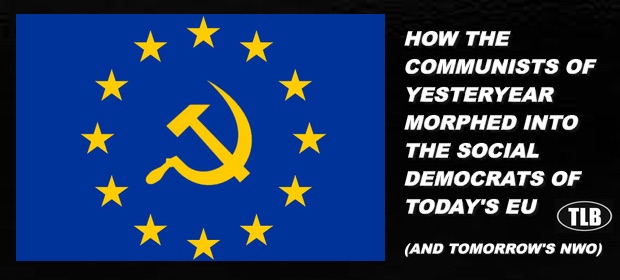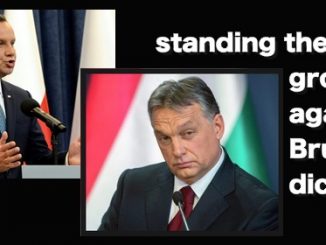
From the USSR to the EU
GEFIRA.ORG
When the so called communist system had crumbled in Eastern European countries, their respective societies embraced Western-style democracy and economy, which, taking into consideration the development gap between the two systems came as no surprise. What was stunning, however, was the fact that yesterday’s communists became today’s social-democrats; yesterday’s enemies of the West transpired as today’s ardent friends of the west; yesterday’s anti-liberal propagandists had no difficulty changing sides and becoming today’s pro-liberal propagandists; why, to top it all, yesterday’s Moscow’s footstools turned into the Kermlin’s fierce critics. It does not stand to reason that they (i) became capitalists overnight and that (ii) they converted to western values in droves.
The same people in a position of power who before 1989 would punish their compatriots for entertaining a mere thought of emigrating to the West or copying Western-style political or economic solutions; the same people at the helm who would not even ponder leaving the Warsaw Pact and joining NATO, arguing that geopolitics was such as to impede any such attempts; the same people who, after 1989, came to laugh at the opponents of the European Union or NATO.
A case in point: Poland. For four decades the country was ruled by the Polish United Workers’ Party (pictured) (Polish abbreviation: PZPR, a socialist party), a harbinger of socialism made in the USSR, a champion of  the eternal friendship of the socialist brotherly countries, a tough opponent of anything Western (save for technology that began to be purchased in the 70s in a bid to raise the nation’s productivity and living standard). The party’s antagonists, who did not approve of socialism nor the fraternity with Moscow, would be fiercely persecuted in the 50s, discriminated against in the 60s, barely tolerated in the 70s and, again, oppressed in the 80s (the imposition of martial law). The very last victims (among them the three Catholic priests – Sylwester Zych, Stanisław Suchowolec and Stefan Niedzielak) were murdered on the eve of the changes, when the round table talks were taking place, proclaiming the demise of communism and the birth of democracy.
the eternal friendship of the socialist brotherly countries, a tough opponent of anything Western (save for technology that began to be purchased in the 70s in a bid to raise the nation’s productivity and living standard). The party’s antagonists, who did not approve of socialism nor the fraternity with Moscow, would be fiercely persecuted in the 50s, discriminated against in the 60s, barely tolerated in the 70s and, again, oppressed in the 80s (the imposition of martial law). The very last victims (among them the three Catholic priests – Sylwester Zych, Stanisław Suchowolec and Stefan Niedzielak) were murdered on the eve of the changes, when the round table talks were taking place, proclaiming the demise of communism and the birth of democracy.
The Soviet Union, though still alive, had just released its grip on Eastern Europe, so old party members, having carefully selected members of the opposition, began negotiations about how to share political power and what political course to take. With the talks at their end, the Polish United Workers’ Party dissolved or rather morphed into a social-democratic one, and its members continued to take an active part in policy making. They all all of a sudden fell in love with western democracy and liberalism.
 Aleksander Kwaśniewski (pictured), a party apparatchik from 1977 till 1990 (ipso facto a defender of the socialist political and economic system), as a politician in his capacity of, consecutively, a minister in a post-1989 government and ultimately president of Poland was either supportive of or pursued the policy of joining Poland to the European Union and NATO;1) Leszek Miller, a PZPR Politburo member, then among others a prime minister in democratic Poland, supervised accession talks with the European Union;2) Włodzimierz Cimoszewicz, a foreign minister and prime minister, active in joining Poland to the European Union;3) Danuta Hübner, a 1970–1987 member of the Polish United Workers’ Party, lavished with career opportunities even during the time of socialist Poland including scholarly grants to Spain, the USA and United Kingdom, eventually became the first Polish commissioner in Brussels; 4) Leszek Balcerowicz, an influential member of the Polish United Workers’ Party, for many years on the staff at the Institute of Marxism-Leninism, then a convert to capitalism, an architect of post-1989 reforms modelled on Jeffrey Sachs’ ideas5).
Aleksander Kwaśniewski (pictured), a party apparatchik from 1977 till 1990 (ipso facto a defender of the socialist political and economic system), as a politician in his capacity of, consecutively, a minister in a post-1989 government and ultimately president of Poland was either supportive of or pursued the policy of joining Poland to the European Union and NATO;1) Leszek Miller, a PZPR Politburo member, then among others a prime minister in democratic Poland, supervised accession talks with the European Union;2) Włodzimierz Cimoszewicz, a foreign minister and prime minister, active in joining Poland to the European Union;3) Danuta Hübner, a 1970–1987 member of the Polish United Workers’ Party, lavished with career opportunities even during the time of socialist Poland including scholarly grants to Spain, the USA and United Kingdom, eventually became the first Polish commissioner in Brussels; 4) Leszek Balcerowicz, an influential member of the Polish United Workers’ Party, for many years on the staff at the Institute of Marxism-Leninism, then a convert to capitalism, an architect of post-1989 reforms modelled on Jeffrey Sachs’ ideas5).
The question remains why. Why did yesterday’s communists convert to today’s capitalists; why did yesterday’s advocates of the USSR become today’s advocates of the EU? Were they idealists in the first place? Did they believe in what they had previously proclaimed and served? Did they have to change their convictions while joining the European Union?
A case in point: Romania. Ion Iliescu, a former high-placed communist, member of the Central Committee of the Romanian Communist Party, then in his capacity as the country’s president after the deposition of Nicolae Ceaușescu, an advocate of Romania’s European Union and NATO membership.6)7)
Initially, the idea of the European Union was thought up by Christian politicians Alcide De Gasperi  (Italian Christian Democrat, Catholic), Jean Monnet (political economist, Catholic – pictured), Robert Schuman (Christian Democrat, Catholic), and Paul-Henri Spaak (Belgian prime minister, Catholic) and, as such, was not at first attractive to socialists, social-democrats and communists. Why, the leftist or left-leaning parties, organisations and activists would steer clear of any association with religion which they regarded as backward, suppressive and superstitious.
(Italian Christian Democrat, Catholic), Jean Monnet (political economist, Catholic – pictured), Robert Schuman (Christian Democrat, Catholic), and Paul-Henri Spaak (Belgian prime minister, Catholic) and, as such, was not at first attractive to socialists, social-democrats and communists. Why, the leftist or left-leaning parties, organisations and activists would steer clear of any association with religion which they regarded as backward, suppressive and superstitious.
In the 50s and 60s of the previous century, the left had the time of their life: the Soviet Union, a state based on Marxist ideology, had just grown to world prominence; half of Europe turned socialist, the other half was increasingly left-leaning; the Third World, imbued with Marxist ideas, began to rebel against Western colonisers; capitalist governments bowing to the pressure from the East and in fear of having a social revolution on their hands started to implement social(ist) programmes; last but not least, the Catholic Church thought fit to undergo far-reaching reforms and so its cardinals and bishops convened in the Vatican to make Catholicism more palatable to the modern world (as the saying goes: once the people stopped following the Church’s teaching, the Church began to teach what the people wanted to hear).
Then, in the 70s came a change. East European communist rulers, after a time of revolutionary bigotry, having unsaddled their political opponents, began slowly to realise that socialism did not quite work as their ideological teachers of the past had promised it would, that the economy needed market incentives or else there were constant shortages, shoddy workmanship, and the resulting dissatisfaction of the populace. This was especially clear to the second generation of communists. Sooner (Hungary, Poland) or later (USSR) market mechanisms of supply and demand as well as incentives in the form of profit and fear of loss were allowed to play an increasingly larger role in the so-called socialist economies. The two systems, capitalism and socialism, began to converge: for East European party apparatchiks, nominally capitalist Sweden was more of a social and economic model than the USSR.
Eventually, when the last ideological impediment was removed in that the Western European countries stripped themselves of Christian cultural vestiges, i.e. after the left had taken over the European project from the Catholic founding fathers, East European socialists, the second and third generation of sworn communists, men and women who went to (not infrequently Western) universities and came to appreciate the bourgeois life-style saw no reason why they should not fraternise with their Western ideological counterparts.
A case in point: East Germany. Angela Merkel, a daughter of an evangelical pastor who had earned himself the nickname Rote Pastor, Red Pastor, as he was trying to combine Christianity with socialism  (so much that he opposed unification of East Germany with capitalist West Germany). Merkel herself was an active FDJ (Freie Deutsche Jugend – Free German Youth) member, where she was for a time secretary for (socialist) Agitation and Propaganda.8)In the meantime, the West German state had evolved towards socialism close enough for her to accept the unification of the two states and then in turn be accepted by the majority of Germans as chancellor of the whole with her socialist approach to policy-making. Her “Wir schaffen das” catchphrase is traced back to her political experiences in East Germany 9)10); Gregor Gysi, today’s member of The Left (Die Linke), yesterday’s SED member (Socialist Unity Party of Germany), its last short-termed chairman, who set about transforming it into a social-democratic party.11)
(so much that he opposed unification of East Germany with capitalist West Germany). Merkel herself was an active FDJ (Freie Deutsche Jugend – Free German Youth) member, where she was for a time secretary for (socialist) Agitation and Propaganda.8)In the meantime, the West German state had evolved towards socialism close enough for her to accept the unification of the two states and then in turn be accepted by the majority of Germans as chancellor of the whole with her socialist approach to policy-making. Her “Wir schaffen das” catchphrase is traced back to her political experiences in East Germany 9)10); Gregor Gysi, today’s member of The Left (Die Linke), yesterday’s SED member (Socialist Unity Party of Germany), its last short-termed chairman, who set about transforming it into a social-democratic party.11)
The new generation of former communists saw their chance in changing sides, and so they abandoned their loyalty to the Union of the Soviet Socialist Republics and pledged allegiance to the Union of the European Socialist Republics. At the very last socialism received its human face in terms of western-style democracy and liberalism. Old concepts were renamed: socialist democracies lost its “people’s” or “socialist” determiner, internationalism changed to globalism, working-class rights were replaced with those of sexual, gender and ethnic minorities, the open enmity towards religion, nationalism and tradition evolved into tolerance and indifference; censorship metastasized into political correctness. The two systems became so close that even the idea of uniting the European Union with the USSR was pondered for a time12).
 Meanwhile the West also performed its part. The 1968 generation of leftist activists and their spiritual leaders adoring Chairman Mao and Ho Chi Minh began the march through the institutions and grabbed hold of the nascent European Union. Altiero Spinelli in Italy, Daniel Cohn-Bendit in France and Joschka Fischer in Germany to name just a few played an important role in shaping the collective psyche of the Europeans after their leftist fashion. While the working-class East European unsophisticated communists were sending their children to universities, thus elevating them to a social higher status, the children of sophisticated West Europeans were fraternising with the working-class, abandoning their elevated social status, and rioting against the bourgeois values. The ideological gap between West and East has been bridged, paving the way for a European unity.
Meanwhile the West also performed its part. The 1968 generation of leftist activists and their spiritual leaders adoring Chairman Mao and Ho Chi Minh began the march through the institutions and grabbed hold of the nascent European Union. Altiero Spinelli in Italy, Daniel Cohn-Bendit in France and Joschka Fischer in Germany to name just a few played an important role in shaping the collective psyche of the Europeans after their leftist fashion. While the working-class East European unsophisticated communists were sending their children to universities, thus elevating them to a social higher status, the children of sophisticated West Europeans were fraternising with the working-class, abandoning their elevated social status, and rioting against the bourgeois values. The ideological gap between West and East has been bridged, paving the way for a European unity.
************
ER recommends other articles by Gefira.org
 Find out about our great (WOW) TLB Project Membership package and benefits, add your voice and help us to change the world!
Find out about our great (WOW) TLB Project Membership package and benefits, add your voice and help us to change the world!
References
1. ↑ Aleksander Kwaśniewski /kva-shnev-skee/, Wikipedia.
2. ↑ Leszek Miller, /lesh-ek meel-ler/ Wikipedia, (Polish).
3. ↑ Włodzimierz Cimoszewicz /vwaw-jee-myesh chee-maw-shev-eech/, Wikipedia.
4. ↑ Danuta Hübner, Wikipedia (English).
5. ↑ Leszek Balcerowicz /lesh-ek bahl-tzer-aw-vich/, Wikipedia.
6. ↑ Ion Iliescu, Wikipedia.
7. ↑ Profile: Ion Iliescu, BBC 2000-12-11.
8. ↑ Angela Merkel, Wkipedia.
9. ↑ Die späte Rache der DDR an Angela Merkel, Welt 24 2015-10-27.
10. ↑ Die frühen Jahre der Angela Merkel, Welt 24 2013-05-12.
11. ↑ Gregor Gysi, Wikipedia.
12. ↑ Russian dissident who copied the Gorbachev Foundation’s archive: Mitterrand and Gorbachev wanted the European Socialist Union, Thatcher opposed Germany’s reunification, HotNews. Ro 2009-09-28.




